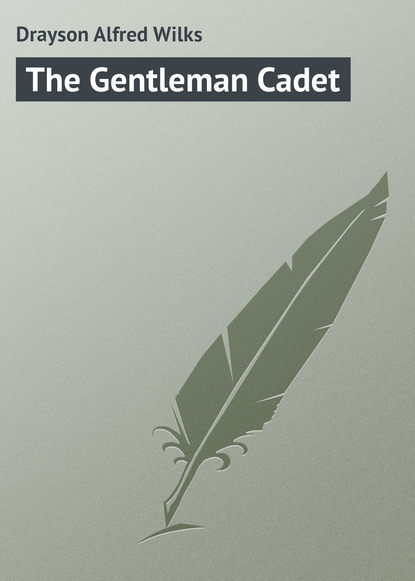По всем вопросам обращайтесь на: info@litportal.ru
(©) 2003-2024.
✖
The Gentleman Cadet
Настройки чтения
Размер шрифта
Высота строк
Поля
“Ah! some one has given you a ‘cold pig,’ I suppose, because you snored so. Don’t you make such a row again.”
When I was at home it was instilled into me that it was almost certain death to sleep in a damp bed, and numerous instances were quoted to me of persons who had either died of consumption, or been cripples for life in consequence of sleeping in wet sheets. In the present instance, however, there was no help for it. I must either sit up all night, or sleep in the bed, wet as it was. I was so completely tired, so utterly worn out, bodily and mentally, that I did not care who it was had thrown the water on me. My head ached, from over-thought as much as from the blows I had received in my fight, and I again laid down in the wet bed, and slept as well as though in my own room at home.
I had not half completed what would have been a fair night’s rest under ordinary conditions when I was awoke by the shrill voice of a boy shouting “Quarter!” I at first imagined this cry might mean something connected with a battle, and that the enemy were calling out for quarter; but on fully awaking I found each boy jumping up, and rushing to a basin of water and washing in the greatest haste. I followed the example set me by the other boys, from whom I learnt that we all had to be in the schoolroom by six o’clock, and any boy who was not in the room when the clock struck got no breakfast. We all rushed from our room about a minute before the clock struck, and entered the school where I had been on the previous day; and I then found that between six and seven a proposition in Euclid had to be learnt on nearly every morning. So I was at once started at my definitions.
In the hour allotted I managed to learn my definitions, and said them to the satisfaction of Mr Monk, and was able, therefore, to go out with the other boys for the half-hour preceding breakfast.
During the next two days our routine was very similar to that of the first day. I soon fully realised the fact that I was more backward, if not more stupid, than any boy in the school; and I also learnt that no one believed it possible I could ever be prepared to pass the examination for entrance to the Academy. There were boys at the school of only twelve years of age, who were far beyond me, who were not to be sent up for examination until they were fifteen years of age. In those days a boy was allowed only one trial for entrance, and if he then failed he never had another given him; and he consequently lost all chance of becoming a cadet. So it was, at least, a prudent precaution to keep a boy at school until he was well qualified to pass his examination. There was also then, as now, considerable rivalry amongst the schoolmasters who prepared for Woolwich Academy, and it was considered a feather in the cap of the individual who had prepared the first boy on the list. To send up any boy, therefore, badly prepared was imprudent, and also not likely to reflect any credit on the establishment from which he had been sent.
I used my best endeavours to get on, but found that my brain would not work as would that of other boys: it seemed like a limb that has not been used for many weeks and is suddenly called upon for some hard work; it becomes stiff and unable to work in a very short time. I also noticed that none of the masters seemed to take much trouble about me. It appeared as though they had agreed that I was not in the race for the Academy, and therefore it was unnecessary for them to trouble themselves much about me.
In three days an entire change had come over me. I had lost all pride in myself, and felt that I must merely drag on an existence at this school for a time. I had not the courage to write to my father and tell him it was impossible I could pass my examination, as I was such a dunce; for I knew such an announcement would not be believed by him, or, if believed, it would be most unpleasant news. I hoped, too, that it was possible I might by practice get accustomed to the noise at the school, and might, like other boys, be able to learn like a parrot the problems in Euclid. My life was certainly a most miserable one. I was still the last new boy, and as such had various tricks played upon me; but it seemed that my nature was somehow changed, and that I did not feel as sensitively as I did on first joining Mr Hostler’s.
One day per week at Mr Hostler’s was devoted to drawing of various kinds, and languages; and this day was a great relaxation after the perpetual Euclid, arithmetic, or algebra. I rather looked forward, also, to seeing Mr Walkwell, the drawing-master, who, I was told, was very amusing and quite a character, and who was very fond of boys. On going into school after breakfast, I saw Mr Walkwell. He was a short, spare man, with a flexible face, which he had the power of altering in a marvellous manner. His arms and legs also he could swing about in a wild kind of way that seemed quite dangerous. As we all entered the school, Mr Walkwell called out in a deep, loud voice that one would scarcely believe possible could emanate from so small a man, —
“Every boy to his seat instantly?”
Each boy jumped into a place except myself, and, not knowing where to go, I stood looking at Mr Walkwell.
“New boy,” said Mr Walkwell, pointing his finger at me threateningly. “New boy! See. Ought to be an artist. Large perceptives, comparison well developed, ideality large, temperament nervous. New boy, you can draw?”
“No, sir,” I said, “I can’t draw.”
“What’s your name, new boy?”
“Shepard, sir.”
“Gentle Shepard – not of Salisbury Plains – come and sit here. That’s always to be your place. Now, boys, listen to the three great rules of drawing.”
Mr Walkwell here took a piece of chalk and sketched on a black board in about half a dozen lines a small landscape. As he drew these lines, he said, —
“Listen, boys! There are three rules in drawing to be attended to. There is the distant, or delicate – see here the distant hills; the middle ground, or spirited; and the foreground, or bold.”
As he completed his remarks, he lowered his voice from the high falsetto at which he had commenced to the deepest base, whilst at the same time he ran his chalk about in a most skilful manner over the lines he had drawn, and filled in a very effective landscape.
“Now, Shepard,” he said, “you, as new boy, always remember these golden rules, and you must draw. Take a pencil now and copy this gate.”
I was here given a copy, a piece of drawing-paper, and a spare piece of paper to try my pencil on. I very soon copied the gate, and then amused myself in sketching a yacht, such as I had seen in the Solent, and making the Isle of Wight the distant, or delicate, and some posts the foreground, or bold. It was a scene I could call to mind, and I seemed to be again in Hampshire, enjoying my liberty. So engrossed was I with this fancy sketch, that at first I did not notice all the boys’ eyes turned on me with curiosity. I soon saw, however, that I was the object of general attention; and on looking round I saw Mr Walkwell leaning over me, watching what I was doing.
“New boy, give me that,” said Mr Walkwell; “you are idling.”
I gave up the paper, feeling certain that either three cuts on the hand or some other punishment would be given to me. Mr Walkwell looked at the drawing, and then at me, and then said, —
“Shepard, I must report you to Mr Hostler.”
“Please, sir, don’t!” I said; “I’ll never idle again.”
At that instant Mr Hostler came into the room and said, —
“Well, Mr Walkwell, how are you? Are the boys doing well?”
“Very fairly, sir, very fairly; but I have to report the new boy to you.”
“What, Shepard? Ah, I’m afraid he is a failure. Come here, Shepard!”
I got up from my seat and walked up to where Hostler and Walkwell were standing, feeling ready to faint from nervousness.
“New boy Shepard, Mr Hostler, has told me a story. I asked him if he could draw, and he said ‘No,’ and I have now seen him out of his own head draw this sketch, sir. Look at the curve of that yacht’s sails; see the way he has fore-shortened her; look how she rests on the water. Why, for a man that’s a work of art. That boy is an artist, sir, and he told me he couldn’t draw.”
It is very difficult to describe my feelings during this conversation. I had twice been surprised at discovering my ignorance during the past few days, and now I had a surprise in discovering that I was possessed of a skill in drawing which was above the average. I used to amuse myself when at home in drawing on a slate vessels and boats that I had seen when I had gone down to Lymington or Beaulieu, but that there was any great difficulty in drawing such things I had never imagined, or had I the slightest idea that other boys could not do so well – if not better than I did.
I was certainly pleased to find that there was something in which I was not a dunce; and although I was a laughing-stock of the school on account of my ignorance of mathematics and Euclid, I was held up as something unusually clever in drawing.
“Shepard,” said Mr Hostler, “I am glad to find you can do something well, but it’s a pity you have wasted your time in learning only drawing, to the neglect of mathematics. Drawing never passed a boy into the Academy, and it doesn’t count much afterwards. Very well, Mr Walkwell, make a good artist of him, and he’ll then have a profession always ready for him in case he wants it; but I wish, for his sake, he’d some knowledge of Euclid, and less of drawing.”
From that day Mr Walkwell paid great attention to my instruction, and I improved rapidly under his tuition, and after some dozen lessons I was considered the best in the drawing-class.
Chapter Five
Mr Hostler’s Cram-School
It was the practice for our school to be taken out for a walk on Sunday mornings, and to go on to the barrack-field at Woolwich, to see the march past previous to the troops going to church. At this march past the splendid band of the Royal Artillery used to play at the head of the regiment, whilst immediately following the band, and heading the regiment, were two companies of gentlemen cadets.
At the church-parade on Sundays the cadets turned out in full-dress, which consisted of white trowsers, a blue tailed coat with red facings, a shako and plume. Such a dress now would look old-fashioned, but to my boyish eyes it seemed in those days the pattern of neatness, and of a soldierlike appearance.
To me everything military possessed the charm of novelty, but I must own that nothing I had ever imagined previously came up, in my ideas, to the magnificent sight that I for the first time now witnessed. I had never before heard a military band, and I gazed with wonder at the immense display of musicians, headed by a splendid-looking man, arrayed in gold lace, and swinging a huge gold-headed stick, as tall as himself, which he dexterously manipulated in time with the music. There is always something spirit-stirring in the sound of martial music, and I stood entranced as the band marched past me, turned sharp to the left as though worked by machinery, and, wheeling about, faced me, as they continued the slow march they were playing.
“Here come the gentlemen cadets!” said some of the civilians, who by hundreds had assembled to see the Sunday march past. “Look how splendidly they march?”
“What a fine set of young fellows!”
I pushed myself into a front position as I heard these remarks, and saw advancing at a slow march a line of soldiers, moving as though they were part and parcel of each other. With heads erect, and shoulders well thrown back, this line advanced; the marching was perfect. As the leading company approached a flag, beside which were several officers, who I noticed were covered with medals, a tall cadet shouted, “Bear rank take open order!” and, coming out to the front, led the company onward. So new was the sight to me, so splendid did it all appear, and so imposing, that I felt a half-choking sensation as I looked at and admired every movement. As the leading cadet passed the flag I saw him go through some movement, which concluded with his raising his hand to his cap in what I knew must be a salute. I heard murmurs of applause among the bystanders, and the deep, decided voice of an old officer at the flagstaff exclaim, “Well marched, gentlemen; very well marched.”
There was a something, I don’t know what to call it, but it seemed like a flash of intelligence passed across the faces of the cadets as they heard these words. They marched on as rigidly as ever, not a cadet an inch before or behind his neighbour, but there was a sparkle in the eye of each cadet that showed the words spoken by the officer had been heard and appreciated by front and rear rank of the cadets.
“Who is that officer?” I heard a civilian ask.
“That is Lord Bloomfield, the commandant,” was the reply.
I looked at the commandant, and saw a handsome, soldierlike-looking man in a splendid uniform, but he was too far removed from me in years and rank to produce any special sympathy on my part; the hero of the day in my mind was the cadet who had given the order to open the ranks, whilst every one of the forty cadets forming the first company that had marched past was to me an object of admiration. At that moment I would have given much to have been one among that company, and to have marched past as they had marched.
As the cadets marched before us, I could hear some of my schoolfellows calling attention to several cadets who were known to them.
“There’s Duckworth, who passed third last Christmas,” said one of them. “He’s second of his batch now, and is sure of the Engineers, they say.”
“There’s Hobson in the rear rank, with the brass collar; he got second-class mathematical prize; and see how well Jackson marches; he’s an awful swell now since he got sixty runs and carried out his bat in the last match with the officers. Look at that brute Tims,” exclaimed another; “I hope he’ll be spun at his probationary, or he’ll be an awful bully as an old cadet when I am a neux.”
These and other similar remarks I heard near me, just as a feeling of utter misery came over me as I realised the fact that it was impossible I could ever be a cadet. What I had seen on that parade had instilled into me military ambition, and if I had then and there been offered the option of a peerage or of being a gentleman cadet, I am perfectly certain I should have jumped at the chance of being a cadet. I now fully realised the absurdity of my having said at Mr Hostler’s that I was going to be an engineer, for I had already discovered that I was, compared to other boys, a dunce, and that it required a boy to be not only very clever, but to have been thoroughly well prepared, to stand any chance of being among the first flight in the intellectual race at the Academy. Consequently my remarks about being an engineer, though uttered in all simplicity and ignorance by me, appeared to others as conceited and vain-glorious, as though it were announced that a screw of a horse was going to Epsom to win the Derby. I was now not surprised that I had been, and still remained, a laughing-stock to my schoolfellows on account of my ignorance.









